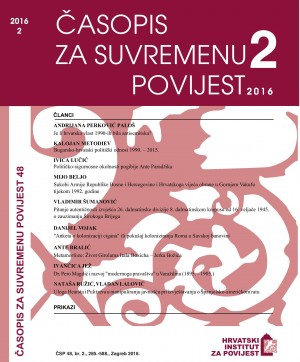Političko-sigurnosne okolnosti pogibije Ante Paradžika
The Political and Security Circumstances of Ante Paradžik’s Death
Author(s): Ivica LučićSubject(s): Military history, Political history, Transformation Period (1990 - 2010), Post-Communist Transformation
Published by: Hrvatski institut za povijest
Keywords: Croatia; Yugoslavia; Zagreb; Croatian Party of Right; war; police; the military;
Summary/Abstract: The death of Ante Paradžik at a police checkpoint in Sesvete on 21 September 1991 is the result of a series of unfortunate circumstances. These include the fear and war psychosis that prevailed in Zagreb at that time, which were exacerbated by rumours and disinformation as well as repeated media warnings about internal enemies. Another factor that led to the tragedy was the special traffic regulations caused by the blackout – citizens and police had no previous experience with such measures. Further factors include the unprofessionalism and opportunism of certain members of the old Yugoslav milicija (civilian police), who were burdened with private relations from their past and complexes related to serving in the recently-collapsed regime, as well as the lack of training or experience among newly-employed policemen who were only partially trained for armed combat and lacked the necessary knowledge regarding police work and procedures. All of this took place during an undeclared state of war, when an old state was disintegrating and new one was being formed. The old state, i.e. republican, institutions, based on Marxist ideology and the rule of the League of Communists of Yugoslavia, fell apart while new ones, ideologically opposed to the old but still based on the previous regime’s institutions and cadres, had yet to be built. The newly-elected government won its legitimacy at the elections and referendum and was fighting to attain legality and receive international recognition while leaving the Yugoslav federation. However, this government wasn’t efficient – indeed, such a thing was impossible under the given circumstances. Franjo Tuđman, the head of state, was often forced to make tactical compromises and take actions that weren’t popular among a part of the public because they made him look like he was giving up on his designated goals. In time, it became clear that his actions had been necessary precisely to attain these goals. Paraga’s Party of Right sought to exploit these political cracks between strategic decisions and tactical actions, between desires and actual capabilities by using aggressive publicity stunts, revolutionary rhetoric, and a party militia. They tried to attract the “right wing” of the political public, but were simultaneously useful to the “left wing”. They were united by the desire to remove Tuđman and his party from the political scene and create a space for their sectarian ideas and ambitions. One of the victims of the entire state of affairs in Croatian society was Ante Paradžik, who found himself “in the wrong place at the wrong time”
Journal: Časopis za suvremenu povijest
- Issue Year: 48/2016
- Issue No: 2
- Page Range: 355-388
- Page Count: 34
- Language: Croatian

